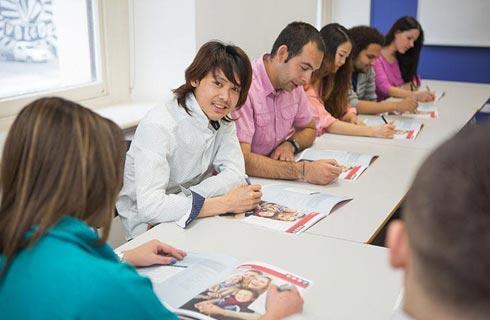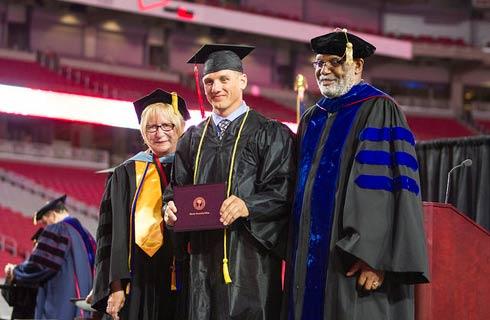- IDP China>
- 课程库>
- 自然科学>
- 自然科学与物理学>
- 物理与天文学>
- BSc (Hons) Physics with Astrophysics - Glasgow International College (GIC)
理学学士(荣誉)与天体物理学-格拉斯哥国际学院(GIC)
BSc (Hons) Physics with Astrophysics - Glasgow International College (GIC)

学历文凭
Bachelor Degree with Honours

专业院系

开学时间

课程时长

课程学费

国际学生入学条件
Standard academic entry requirements: 36 points including three HL subjects at 6,6,5 guaranteed offer if additional requirements met.
Minimum academic entry requirements: 32 points including three HL subjects at 6,5,5 considered for offer if additional requirements met.
Additional requirements: Mathematics AND Physics: one at HL6 and the other HL6 or SL6. Applicants to joint degrees must meet the entry requirements of both subjects.
International English Language Testing System (IELTS) Academic module (not General Training): overall score 6.5 no sub-test less than 6.0. ibTOEFL*: 90, no sub-test less than: Reading: 20, Listening: 19, Speaking: 19, Writing: 23
IDP—雅思考试联合主办方

雅思考试总分
6.5
- 雅思总分:6.5
- 托福网考总分:90
- 托福笔试总分:160
- 其他语言考试:PTE Academic (Pearson Test of English, Academic test): 60, no sub-test less than 59
CRICOS代码: F3F5
申请截止日期: 请与IDP联系 以获取详细信息。
课程简介
In this degree programme the study of physics is particularly focused on astrophysical phenomena: from stars and planets to galaxies and cosmology. Astrophysics provides a natural laboratory in which to explore the laws of physics, and in certain astrophysical objects: such as pulsars, quasars and black holes, to test those laws under extreme conditions. You will gain a basic understanding of the main topics in theoretical physics and will be introduced to the methods of experimental physics, thereby providing a solid foundation for further study in physics.<br><br>You will have training in more specialised experimental techniques and expand your knowledge of modern physics research. You will also be introduced to the foundations of astrophysics, covering topics including the physics of our solar system, the origin of stars and galaxies, and the evolution of the universe. If you progress to Honours (years 3 and 4) you will continue to study core topics in greater depth but will also study specialist subjects of your choice in depth and will undertake project work, often within a world-leading research group.
相关申请
 预科
预科 奖学金
奖学金 实习机会
实习机会 在校学习
在校学习 跨境学习
跨境学习 校园授课-线上开始
校园授课-线上开始 在线/远程学习
在线/远程学习
开学时间&学费
学费信息仅供参考,请与IDP联系以获取详细信息
| 开学时间 | 时长 | 学费 | 地点 |
|---|---|---|---|
| 暂无 | 暂无 | 暂无 | 暂无 |
本校相关课程

强化英语-利物浦
学历文凭
English Language
开学日期
课程费用总额


硕士预科课程-布莱顿大学国际学院
学历文凭
Foundation for Postgraduate
开学日期
课程费用总额


硕士预科课程
学历文凭
Foundation for Postgraduate
开学日期
课程费用总额


计算机基础证书-布莱顿大学国际学院
学历文凭
Foundation for Undergraduate
开学日期
课程费用总额


商业基础证书
学历文凭
Foundation for Undergraduate
开学日期
课程费用总额


商业基础证书
学历文凭
Foundation for Undergraduate
开学日期
课程费用总额

其他相关课程

理学学士(物理学)荣誉
 伊迪斯科文大学
伊迪斯科文大学学历文凭
Bachelor Degree with Honours
开学日期
课程费用总额


理学学士(荣誉学位)-物理学
 伍伦贡大学
伍伦贡大学泰晤士高等教育世界大学排名:247
学历文凭
Bachelor Degree with Honours
开学日期
课程费用总额


哲学硕士(物理)
 科廷大学
科廷大学泰晤士高等教育世界大学排名:256
学历文凭
Masters Degree (Research)
开学日期
课程费用总额


哲学博士(物理)
 纽卡斯尔大学
纽卡斯尔大学学历文凭
Ph.D.
开学日期
课程费用总额


理学学士(高性能计算物理)(荣誉学位)
 阿德莱德大学
阿德莱德大学学历文凭
Bachelor Degree with Honours
开学日期
课程费用总额


理学学士(空间科学和天体物理学)
 阿德莱德大学
阿德莱德大学学历文凭
Bachelor Degree
开学日期
课程费用总额









 英国
英国
